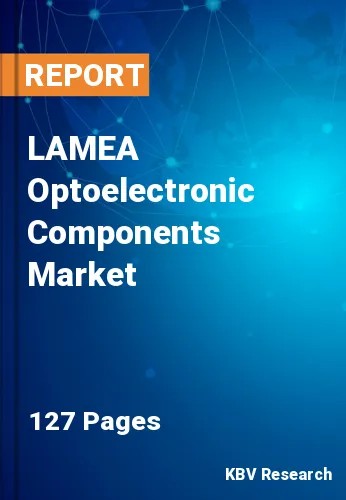The Latin America, Middle East and Africa Optoelectronic Components Market would witness market growth of 8.3% CAGR during the forecast period (2023-2029).
Demand for light-emitting diodes across a range of application categories is anticipated to increase as LEDs are increasingly used in automotive headlamps as well as additional lighting applications. In addition, infotainment systems employed in a range of end-use industries, like hospitality, retail, and malls also utilize LEDs. These systems scan barcodes or codes on packaging materials using optical technologies like image sensors and laser diodes, recognizing objects through images and saving time for inventory management procedures. This technology also makes it possible for users to view product information via an integrated display panel, further increasing customer engagement and boosting sales.
The development of Li-Fi technology, which enables data transfer using light sources to get over limitations in 5G and Wi-Fi, is anticipated to greatly expand the market for optoelectronic components. In addition, this technology is far more energy-efficient than alternative wireless data transmission methods because of its ability to transmit data using light. As a result, companies in the optoelectronic components market will have greater room to expand. The demand for optoelectronic components is being driven by cutting-edge smartphones and wearables with user-friendly screens and camera technology. Additionally, high-tech cameras need image sensors that can take precise, high-quality pictures, which is what is driving the market's expansion.
In order to reduce electricity and water consumption as part of the conservation effort, Dubai Power and Water Authority (DEWA) has underlined the need to use eco-friendly features of home appliances. LED lights are more efficient than conventional bulbs for lighting both inside and outside. DEWA suggests using light detectors to progressively switch off outside lighting during the day. Additionally, timers and dimmers could be used by customers to control the lighting at specific times. For some places, direct illumination is suggested rather than lighting the entire area. The rising utilization of optoelectronic components like LEDs for lighting purposes is mainly driving the expansion of the regional market.
The Brazil market dominated the LAMEA Optoelectronic Components Market by Country in 2022, and would continue to be a dominant market till 2029; thereby, achieving a market value of $1,165.5 million by 2029. The Argentina market is experiencing a CAGR of 8.9% during (2023 - 2029). Additionally, The UAE market would display a CAGR of 8% during (2023 - 2029).
Based on Material, the market is segmented into Gallium Nitride, Gallium Arsenide & Gallium Phosphide, Silicon Carbide, Indium Phosphide, and Silicon Germanium. Based on Application, the market is segmented into Measurement, Lighting, Communication, Security & Surveillance, and Others. Based on Component, the market is segmented into Sensor, LED, and Laser Diode & Infrared Components. Based on Vertical, the market is segmented into Consumer Electronics, Telecommunication, Automotive, Military & Aerospace, Medical, Manufacturing, Commercial, Residential, and Others. Based on countries, the market is segmented into Brazil, Argentina, UAE, Saudi Arabia, South Africa, Nigeria, and Rest of LAMEA.
Free Valuable Insights: The Worldwide Optoelectronic Components Market is Projected to reach USD 60.9 Billion by 2029, at a CAGR of 5%
The market research report covers the analysis of key stake holders of the market. Key companies profiled in the report include Hamamatsu Photonics K.K., OSRAM GmbH (AMS AG), TT electronics PLC, Vishay Intertechnology, Inc., ON Semiconductor Corporation, Cree, Inc. (SMART Global Holdings, Inc.), TRUMPF GmbH + Co. KG, Sick AG, Broadcom, Inc. and Samsung Electronics Co., Ltd. (Samsung Group).
By Material
By Application
By Component
By Vertical
By Country
Our team of dedicated experts can provide you with attractive expansion opportunities for your business.

